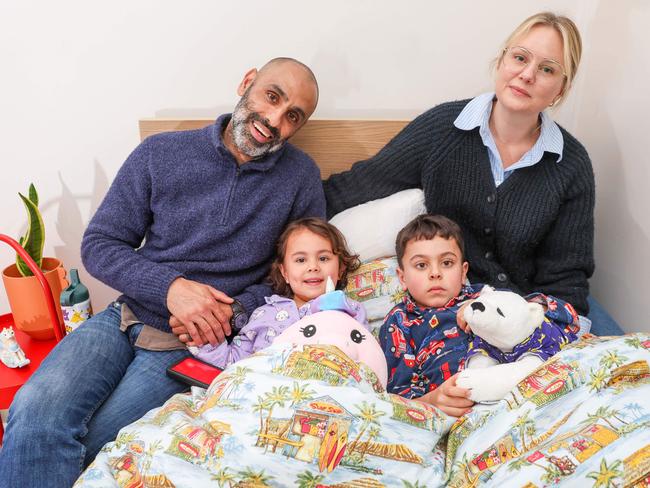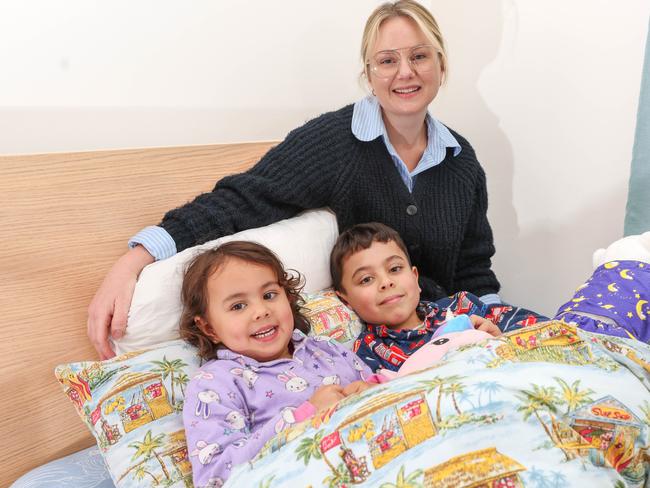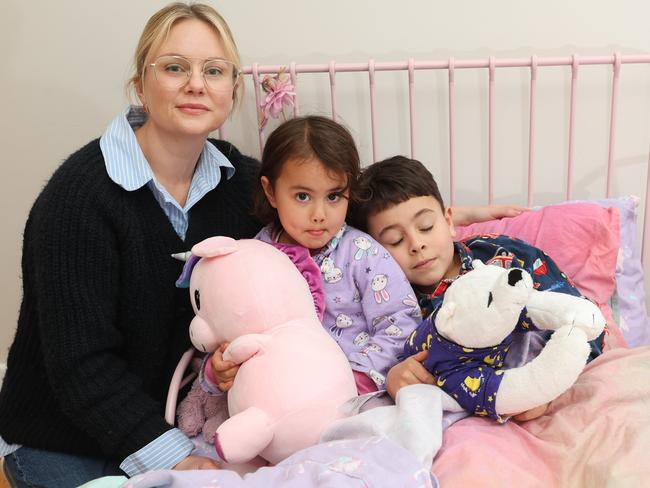Rise in parents seeking help for child sleep problems
For seven years this dad was desperate for a good night’s sleep due to a problem that’s becoming more common in family households. This is how he changed it.
Sleep
Don't miss out on the headlines from Sleep. Followed categories will be added to My News.
For seven years RJ Singh and his wife Tahliaha were desperate for more sleep.
But every night they would face the same issue after putting their son Ahilan to bed at 7.30pm.
“Basically until the age of six or seven he was coming into our bed every night and he couldn’t sleep alone, primarily because we got into a bad habit since he was born,” Mr Singh said.
“He would claim it was nightmares or he was scared, but once he was in our bed you couldn’t get him out and if you did he would cry – the whole house would get disrupted.
“We tried everything – reading books, yelling, different strategies around music, light, sensory control, even bribery.
“It was bad, he wasn’t going into deep sleep, maybe five or six hours and the problem for me was I’m a very light sleeper and I wake up very early.”
Thinking Ahilan may need company, they put him in his little sister Mara Mae’s room.
That just doubled their problems.
“Then they both ended up in our room and by the morning I would be in one of their beds and they would be in the bed with my wife and everyone hasn’t slept properly,” Mr Singh said.
Sick of everyone being grumpy and exhausted, Mr Singh then decided to seek professional help.

They did sleep restriction therapy – and it worked.
Nigh Nigh Sleep practitioner Deb Herdman said this involved changing the sleep homeostatic pressure so someone becomes so tired that they fall asleep much quicker.
Mr Singh said they pushed Ahilan’s sleep time later by increments but still had him wake up at the same time.
When he was falling asleep faster due to being so sleepy, they started to make his bedtime earlier again.
Ms Herdman said she had seen a rise in families, like Mr Singh’s, with primary school aged children needing help.
She said the reasons were varied.
“When parents come to me they are at a desperate point, they’ve tried absolutely everything, they’ve taken away phones or devices and they are really trying to follow a really strict routine but they don’t have much success because the problem is bigger than that,” she said.
“Often it’s the fact the child was not a good sleeper earlier and certainly we know kids who don’t sleep well in infancy come back to be not sleeping well as older children.”
She added another major factor was that parents could be “over the top”.
“They’re not giving their child an opportunity to become an independent sleeper, they are not giving them the opportunity to self-settle,” she said.
“When your child is going down that insomnia/anxiety road, they’re screaming the house down, crying having tantrums ... parents don’t know how to address that.
“I think it is becoming a bigger problem.”
Royal Children’s Hospital respiratory and sleep physician Moya Vandeleur said she had noticed referrals rising at their Melbourne department.
“I could say with surety that there’s been an increase in parents and referrals from GPs to our unit for children with sleep problems,” she said.
“In addition to behavioural sleep issues there are also another set of sleep disorders, so sleep breathing issues.

“Without doubt children that have an increased BMI or are obese, it’s much more common for them to have obstructive sleep apnea.”
Dr Michael Gradisar started the Child & Adolescent Sleep Clinic at Flinders University in South Australia almost two decades ago.
Also the Director of Wink Sleep, he said demand for child sleep help had remained steady since then but there were now more options.
He said parents often made the mistake of trying to deal with the problem on a nightly basis.
“What we have to do is cognitive therapy, which is getting the child themselves to learn the skills to analyse their fears in a different way, so it gets them to be critical and question the thoughts going through their head as opposed to their parents telling them the answers,” he said.
Medical Director of Sleep Services Australia Dr Linda Schachter said she specialised in adult issues but had been getting inquiries about children because waitlists were so long.
“I get inquiries all the time for 11-year-olds, you’re in this difficult situation because you want to help,” she said.

Not-for-profit the Woolcock Institute of Medical Research in Sydney has also been looking at putting on extra services to help families with sleep problems amid huge waits in the public system.
Paediatric Sleep and Respiratory Physician Dr Mimi Lu said some of the biggest issues for young children included snoring and grinding teeth.
“We see some overlap between preschoolers and the early school-aged children who are snoring and they usually have big tonsils, or some sort of allergy-driven symptom and that’s the cohort who see ENT surgeons about having their tonsils or adenoids out,” she said.
“Then it goes to slightly older school-aged children who have had long-term issues, who are getting to the point where their parents say they’ve got to do something about this.”
More Coverage
Originally published as Rise in parents seeking help for child sleep problems





